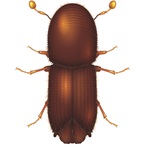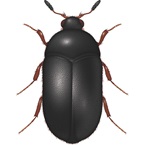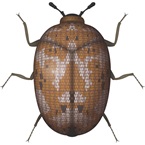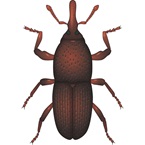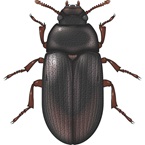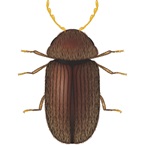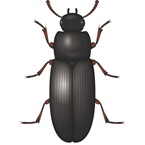Species category: Beetles & Weevils
Scientific name: Dermestes Ater
Family: Dermestidae
Description
A Hide Beetle is 5.5-10mm long and a Larder beetle 7-9mm long, they are a brown/black colour. The Hide Beetle is a silvery white underneath, while the Larder Beetle is distinguished by a grey band of hairs and black flecks across its back.
They are originally thought to be natives of Europe and Asia but are now prevalent all across the world.
These beetles are scavengers and associated in nature with carcasses and bird’s nests. They are often wide-spread in manufacturing and storage premises handling animal products, intensive poultry units, piggeries and domestic premises.
Where the sources of infestation are not immediately obvious e.g. domestic or catering premises, attention should be paid to food stores and spillages, or the presence of dead rodents, birds in attics, under floor spaces.
Behaviour
Typically associated with materials with high protein content, for example hides, skins, feathers, bones, dried meat, fish meal and dog biscuits. Large populations can be encountered, especially where hygiene is poor. An infestation is often an indicator of a dead carcass in the vicinity. Although they eat any animal protein, they sometimes eat vegetable protein too.
Risks
Heavily infested poultry manure that is spread onto fields leads to infestations of nearby properties.
Hairs dislodged from the larvae are known skin irritants. Conjunctivitis is common in people exposed to the insects.
Adults and larvae require a high protein diet and the beetles can be serious pests in hide warehouses, tanneries, milk-processing plants and other premises where animal products are handled.

